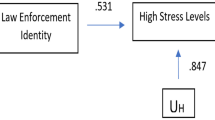Abstract
The Nazis hijacked Germany’s medical establishment and appropriated medical language to hegemonize their ideology. In White Noise, shifting medical information stifles the public into docility. In Nazi Germany the primacy of language and medical authority magnified the importance of academic doctors. The muddling of identities caused complex insecurities and the need for psychological doubles. In White Noise, Professor Gladney is driven by professional insecurities to enact a double in Murray. Through the manipulation of language and medical overreach the U.S., exemplified in the novel White Noise, has become a hypermedicalized society where the spirit of the Hippocratic Oath has eroded.
Similar content being viewed by others
References
Barrett, Laura. 2001. “How the Dead Speak to the Living: Intertextuality and the Postmodern Sublime in White Noise.” Journal of Modern Literature 25.2: 97-113.
Boling, Ronald J. 2002. “Escaping Hitler in DeLillo’s White Noise.” The Philological Review 28.2 : 63-81.
Brownlee, Shannon. 2007. Overtreated: Way Too Much Medicine Is Making Us Sicker and Poorer. New York: Bloomsbury.
Butler, Judith. 2004. “Performative Acts and Gender Constitution.” In Literary Theory: An Anthology, edited by Julie Rivkin and Michael Ryan, 900-911. Malden: Blackwell.
Cantor, Paul A. 1991. “Adolf, We Hardly Knew You.” In New Essays on White Noise, edited by Frank Lentricchia, 39-62. Cambridge: Cambridge University Press.
Clarke, Adele E. 2010. “A Theoretical and Substantive Introduction.” In Biomedicalization: Technoscience, Health, and Illness in the U.S, edited by Adele E. Clark, Laura Mamo, Jennifer Ruth Fosket, Jennifer R. Fishman, and Janet K. Shim, 1-44. Durham: Duke University Press.
DeLillo, Don. 1985. White Noise. New York: Penguin.
Dorr, Gregory Michael. 2011. “Protection or Control? Women’s Health, Sterilization Abuse, and Relf v. Weinberger.” In A Century of Eugenics in America: From the Indiana Experiment to the Human Genome Era, edited by Paul A Lombardo, 161-190. Bloomington: Indiana University Press.
The Greater Good. 2011. Directed by Kendall Nelson and Chris Pilaro. BNP Pictures Production. DVD.
Gawande, Atul. 2009. “The Cost Conundrum.” The New Yorker. http://www.newyorker.com/reporting/2009/06/01/090601fa_fact_gawande Accessed June 1, 2013.
Helyer, Ruth. 2008. “Taking Possession of Knowledge: The Masculine Academic in Don DeLillo’s White Noise.” In Masculinities in Text and Teaching, edited by Ben Knights 205-219. New York: Palgrave.
Kühl, Stefan. 1994. The Nazi Connection: Eugenics, American Racism, and German National Socialism. New York: Oxford University Press.
Lifton, Robert Jay. 1986. The Nazi Doctors: Medical Killing and the Psychology of Genocide. New York: Basic.
Miller, Neil Z. 2009. Vaccines: Are they Really Safe and Effective? Sante Fe: New Atlantean Press.
Nel, Philip. 2006. “Homicidal Men and Full-Figured Women: Gender in White Noise.” In Approaches to Teaching DeLillo’s White Noise, edited by Tim Engles and John N. Duvall, 180-191. New York: Modern Language Assocation of America.
Rank, Otto. 1971. The Double: a Psychoanalytic Study. Chapel Hill: University of North Carolina Press.
Riska, Elianne. 2010. “Gender and Medicalization and Biomedicalization Theories.” In Biomedicalization: Technoscience, Health, and Illness in the U.S., edited by Adele E. Clark, Laura Mamo, Jennifer Ruth Fosket, Jennifer R. Fishman, and Janet K. Shim, 147-170. Durham: Duke University Press.
Seidelman, William E. 1992. “‘Medspeak’ for Murder: The Nazi Experience and the Culture of Medicine.” In When Medicine Went Mad: Bioethics and the Holocaust, edited by Arthur L. Caplan, 271-280. New Jersey: Humana Press.
Wilcox, Leonard. 1991. “Baudrillard, DeLillo’s White Noise, and the End of Heroic Narrative.” Contemporary Literature 32.3: 346-65.
Author information
Authors and Affiliations
Corresponding author
Rights and permissions
About this article
Cite this article
Benson, J. Hypermedicalization in White Noise . J Med Humanit 36, 199–215 (2015). https://doi.org/10.1007/s10912-014-9271-y
Published:
Issue Date:
DOI: https://doi.org/10.1007/s10912-014-9271-y




